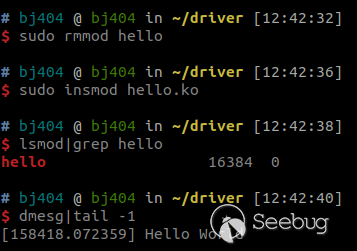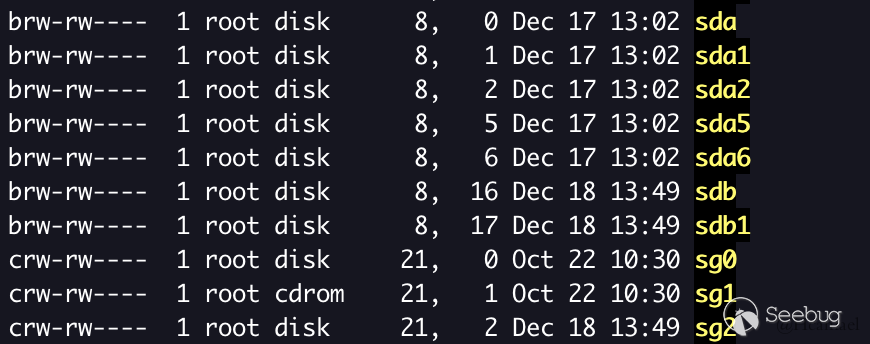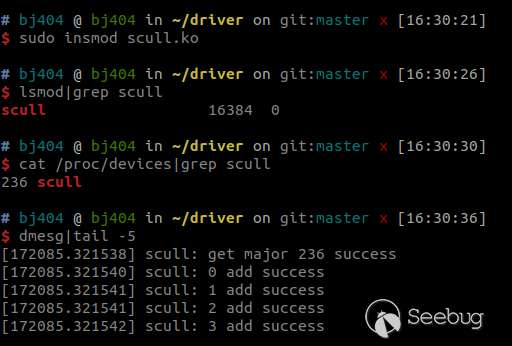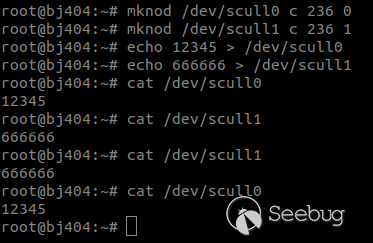从 0 开始学 Linux 驱动开发(一)
作者:Hcamael@知道创宇404实验室
最近在搞IoT的时候,因为没有设备,模拟跑固件经常会缺/dev/xxx,所以我就开始想,我能不能自己写一个驱动,让固件能跑起来?因此,又给自己挖了一个很大坑,不管最后能不能达到我的初衷,能学到怎么开发Linux驱动,也算是有很大的收获了。
前言
我写的这个系列以实践为主,不怎么谈理论,理论可以自己去看书,我是通过《Linux Device Drivers》这本书学的驱动开发,Github上有这本书中讲解的实例的代码[1]。
虽然我不想谈太多理论,但是关于驱动的基本概念还是要有的。Linux系统分为内核态和用户态,只有在内核态才能访问到硬件设备,而驱动可以算是内核态中提供出的API,供用户态的代码访问到硬件设备。
有了基本概念以后,我就产生了一系列的问题,而我就是通过我的这一系列的问题进行学习的驱动开发:
- 一切代码的学习都是从Hello World开始的,怎么写一个Hello World的程序?
- 驱动是如何在/dev下生成设备文件的?
- 驱动怎么访问实际的硬件?
- 因为我毕竟是搞安全的,我会在想,怎么获取系统驱动的代码?或者没有代码那能逆向驱动吗?驱动的二进制文件储存在哪?以后有机会可能还可以试试搞驱动安全。
Everything start from Hello World
提供我的Hello World代码[2]:
|
1 2 3 4 5 6 7 8 9 10 11 12 13 14 15 16 17 18 19 |
#include <linux/init.h> #include <linux/module.h> MODULE_LICENSE("Dual BSD/GPL"); MODULE_AUTHOR("Hcamal"); int hello_init(void) { printk(KERN_INFO "Hello World\n"); return 0; } void hello_exit(void) { printk(KERN_INFO "Goodbye World\n"); } module_init(hello_init); module_exit(hello_exit); |
Linux下的驱动是使用C语言进行开发的,但是和我们平常写的C语言也有不同,因为我们平常写的C语言使用的是Libc库,但是驱动是跑在内核中的程序,内核中却不存在libc库,所以要使用内核中的库函数。
比如printk可以类比为libc中的printf,这是在内核中定义的一个输出函数,但是我觉得更像Python里面logger函数,因为printk的输出结果是打印在内核的日志中,可以使用dmesg命令进行查看
驱动代码只有一个入口点和一个出口点,把驱动加载到内核中,会执行module_init函数定义的函数,在上面代码中就是hello_init函数。当驱动从内核被卸载时,会调用module_exit函数定义的函数,在上面代码中就是hello_exit函数。
上面的代码就很清晰了,当加载驱动时,输出Hello World,当卸载驱动时,输出Goodbye World
PS:MODULE_LICENSE和MODULE_AUTHOR这两个不是很重要,我又不是专业开发驱动的,所以不用关注这两个
PSS: printk输出的结果要加一个换行,要不然不会刷新缓冲区
编译驱动
驱动需要通过make命令进行编译,Makefile如下所示:
|
1 2 3 4 5 6 7 8 9 10 11 12 13 14 15 16 17 |
ifneq ($(KERNELRELEASE),) obj-m := hello.o else KERN_DIR ?= /usr/src/linux-headers-$(shell uname -r)/ PWD := $(shell pwd) default: $(MAKE) -C $(KERN_DIR) M=$(PWD) modules endif clean: rm -rf *.o *~ core .depend .*.cmd *.ko *.mod.c .tmp_versions |
一般情况下,内核的源码都存在与/usr/src/linux-headers-$(shell uname -r)/目录下
比如:
|
1 2 3 4 5 |
$ uname -r 4.4.0-135-generic /usr/src/linux-headers-4.4.0-135/ --> 该内核源码目录 /usr/src/linux-headers-4.4.0-135-generic/ --> 该内核编译好的源码目录 |
而我们需要的是编译好后的源码的目录,也就是/usr/src/linux-headers-4.4.0-135-generic/
驱动代码的头文件都需要从该目录下进行搜索
M=$(PWD)该参数表示,驱动编译的结果输出在当前目录下
最后通过命令obj-m := hello.o,表示把hello.o编译出hello.ko, 这个ko文件就是内核模块文件
加载驱动到内核
需要使用到的一些系统命令:
lsmod: 查看当前已经被加载的内核模块insmod: 加载内核模块,需要root权限rmmod: 移除模块
比如:
|
1 2 |
# insmod hello.ko // 把hello.ko模块加载到内核中 # rmmod hello // 把hello模块从内核中移除 |
旧版的内核就是使用上面这样的方法进行内核的加载与移除,但是新版的Linux内核增加了对模块的验证,当前实际的情况如下:
|
1 2 |
# insmod hello.ko insmod: ERROR: could not insert module hello.ko: Required key not available |
从安全的角度考虑,现在的内核都是假设模块为不可信的,需要使用可信的证书对模块进行签名,才能加载模块
解决方法用两种:
- 进入BIOS,关闭UEFI的Secure Boot
- 向内核添加一个自签名证书,然后使用证书对驱动模块进行签名,参考[3]
查看结果

在/dev下增加设备文件
同样先提供一份代码,然后讲解这份实例代码[4]
|
1 2 3 4 5 6 7 8 9 10 11 12 13 14 15 16 17 18 19 20 21 22 23 24 25 26 27 28 29 30 31 32 33 34 35 36 37 38 39 40 41 42 43 44 45 46 47 48 49 50 51 52 53 54 55 56 57 58 59 60 61 62 63 64 65 66 67 68 69 70 71 72 73 74 75 76 77 78 79 80 81 82 83 84 85 86 87 88 89 90 91 92 93 94 95 96 97 98 99 100 101 102 103 104 105 106 107 108 109 110 111 112 113 114 115 116 117 118 119 120 121 122 123 124 125 126 127 128 129 130 131 132 133 134 135 136 137 138 139 140 141 142 143 144 145 146 147 148 149 150 151 152 153 154 155 156 157 158 159 160 161 162 163 164 165 166 167 168 169 170 171 172 173 174 175 176 177 178 179 180 181 182 183 184 185 186 187 188 189 190 191 192 193 194 195 196 197 198 199 200 201 202 203 204 205 206 207 208 209 210 211 212 213 214 215 216 217 218 219 220 221 222 223 224 225 226 227 228 229 230 231 232 233 234 235 236 237 238 239 240 241 242 243 244 245 246 247 248 249 250 251 252 253 254 255 256 257 258 259 260 261 262 263 264 265 266 267 268 269 270 271 272 273 274 275 276 277 278 279 280 281 282 283 284 285 286 287 288 289 290 291 292 293 294 295 296 297 298 299 300 301 302 303 304 305 306 307 308 309 310 311 312 313 314 315 316 317 318 319 320 321 322 323 324 325 326 327 328 329 330 331 332 333 334 335 336 337 338 339 340 341 342 343 344 345 346 347 348 349 350 351 352 353 354 355 356 357 |
#include <linux/init.h> #include <linux/module.h> #include <linux/kernel.h> /* printk() */ #include <linux/slab.h> /* kmalloc() */ #include <linux/fs.h> /* everything... */ #include <linux/errno.h> /* error codes */ #include <linux/types.h> /* size_t */ #include <linux/fcntl.h> /* O_ACCMODE */ #include <linux/cdev.h> #include <asm/uaccess.h> /* copy_*_user */ MODULE_LICENSE("Dual BSD/GPL"); MODULE_AUTHOR("Hcamael"); int scull_major = 0; int scull_minor = 0; int scull_nr_devs = 4; int scull_quantum = 4000; int scull_qset = 1000; struct scull_qset { void **data; struct scull_qset *next; }; struct scull_dev { struct scull_qset *data; /* Pointer to first quantum set. */ int quantum; /* The current quantum size. */ int qset; /* The current array size. */ unsigned long size; /* Amount of data stored here. */ unsigned int access_key; /* Used by sculluid and scullpriv. */ struct mutex mutex; /* Mutual exclusion semaphore. */ struct cdev cdev; /* Char device structure. */ }; struct scull_dev *scull_devices; /* allocated in scull_init_module */ /* * Follow the list. */ struct scull_qset *scull_follow(struct scull_dev *dev, int n) { struct scull_qset *qs = dev->data; /* Allocate the first qset explicitly if need be. */ if (! qs) { qs = dev->data = kmalloc(sizeof(struct scull_qset), GFP_KERNEL); if (qs == NULL) return NULL; memset(qs, 0, sizeof(struct scull_qset)); } /* Then follow the list. */ while (n--) { if (!qs->next) { qs->next = kmalloc(sizeof(struct scull_qset), GFP_KERNEL); if (qs->next == NULL) return NULL; memset(qs->next, 0, sizeof(struct scull_qset)); } qs = qs->next; continue; } return qs; } /* * Data management: read and write. */ ssize_t scull_read(struct file *filp, char __user *buf, size_t count, loff_t *f_pos) { struct scull_dev *dev = filp->private_data; struct scull_qset *dptr; /* the first listitem */ int quantum = dev->quantum, qset = dev->qset; int itemsize = quantum * qset; /* how many bytes in the listitem */ int item, s_pos, q_pos, rest; ssize_t retval = 0; if (mutex_lock_interruptible(&dev->mutex)) return -ERESTARTSYS; if (*f_pos >= dev->size) goto out; if (*f_pos + count > dev->size) count = dev->size - *f_pos; /* Find listitem, qset index, and offset in the quantum */ item = (long)*f_pos / itemsize; rest = (long)*f_pos % itemsize; s_pos = rest / quantum; q_pos = rest % quantum; /* follow the list up to the right position (defined elsewhere) */ dptr = scull_follow(dev, item); if (dptr == NULL || !dptr->data || ! dptr->data[s_pos]) goto out; /* don't fill holes */ /* read only up to the end of this quantum */ if (count > quantum - q_pos) count = quantum - q_pos; if (raw_copy_to_user(buf, dptr->data[s_pos] + q_pos, count)) { retval = -EFAULT; goto out; } *f_pos += count; retval = count; out: mutex_unlock(&dev->mutex); return retval; } ssize_t scull_write(struct file *filp, const char __user *buf, size_t count, loff_t *f_pos) { struct scull_dev *dev = filp->private_data; struct scull_qset *dptr; int quantum = dev->quantum, qset = dev->qset; int itemsize = quantum * qset; int item, s_pos, q_pos, rest; ssize_t retval = -ENOMEM; /* Value used in "goto out" statements. */ if (mutex_lock_interruptible(&dev->mutex)) return -ERESTARTSYS; /* Find the list item, qset index, and offset in the quantum. */ item = (long)*f_pos / itemsize; rest = (long)*f_pos % itemsize; s_pos = rest / quantum; q_pos = rest % quantum; /* Follow the list up to the right position. */ dptr = scull_follow(dev, item); if (dptr == NULL) goto out; if (!dptr->data) { dptr->data = kmalloc(qset * sizeof(char *), GFP_KERNEL); if (!dptr->data) goto out; memset(dptr->data, 0, qset * sizeof(char *)); } if (!dptr->data[s_pos]) { dptr->data[s_pos] = kmalloc(quantum, GFP_KERNEL); if (!dptr->data[s_pos]) goto out; } /* Write only up to the end of this quantum. */ if (count > quantum - q_pos) count = quantum - q_pos; if (raw_copy_from_user(dptr->data[s_pos]+q_pos, buf, count)) { retval = -EFAULT; goto out; } *f_pos += count; retval = count; /* Update the size. */ if (dev->size < *f_pos) dev->size = *f_pos; out: mutex_unlock(&dev->mutex); return retval; } /* Beginning of the scull device implementation. */ /* * Empty out the scull device; must be called with the device * mutex held. */ int scull_trim(struct scull_dev *dev) { struct scull_qset *next, *dptr; int qset = dev->qset; /* "dev" is not-null */ int i; for (dptr = dev->data; dptr; dptr = next) { /* all the list items */ if (dptr->data) { for (i = 0; i < qset; i++) kfree(dptr->data[i]); kfree(dptr->data); dptr->data = NULL; } next = dptr->next; kfree(dptr); } dev->size = 0; dev->quantum = scull_quantum; dev->qset = scull_qset; dev->data = NULL; return 0; } int scull_release(struct inode *inode, struct file *filp) { printk(KERN_DEBUG "process %i (%s) success release minor(%u) file\n", current->pid, current->comm, iminor(inode)); return 0; } /* * Open and close */ int scull_open(struct inode *inode, struct file *filp) { struct scull_dev *dev; /* device information */ dev = container_of(inode->i_cdev, struct scull_dev, cdev); filp->private_data = dev; /* for other methods */ /* If the device was opened write-only, trim it to a length of 0. */ if ( (filp->f_flags & O_ACCMODE) == O_WRONLY) { if (mutex_lock_interruptible(&dev->mutex)) return -ERESTARTSYS; scull_trim(dev); /* Ignore errors. */ mutex_unlock(&dev->mutex); } printk(KERN_DEBUG "process %i (%s) success open minor(%u) file\n", current->pid, current->comm, iminor(inode)); return 0; } /* * The "extended" operations -- only seek. */ loff_t scull_llseek(struct file *filp, loff_t off, int whence) { struct scull_dev *dev = filp->private_data; loff_t newpos; switch(whence) { case 0: /* SEEK_SET */ newpos = off; break; case 1: /* SEEK_CUR */ newpos = filp->f_pos + off; break; case 2: /* SEEK_END */ newpos = dev->size + off; break; default: /* can't happen */ return -EINVAL; } if (newpos < 0) return -EINVAL; filp->f_pos = newpos; return newpos; } struct file_operations scull_fops = { .owner = THIS_MODULE, .llseek = scull_llseek, .read = scull_read, .write = scull_write, // .unlocked_ioctl = scull_ioctl, .open = scull_open, .release = scull_release, }; /* * Set up the char_dev structure for this device. */ static void scull_setup_cdev(struct scull_dev *dev, int index) { int err, devno = MKDEV(scull_major, scull_minor + index); cdev_init(&dev->cdev, &scull_fops); dev->cdev.owner = THIS_MODULE; dev->cdev.ops = &scull_fops; err = cdev_add (&dev->cdev, devno, 1); /* Fail gracefully if need be. */ if (err) printk(KERN_NOTICE "Error %d adding scull%d", err, index); else printk(KERN_INFO "scull: %d add success\n", index); } void scull_cleanup_module(void) { int i; dev_t devno = MKDEV(scull_major, scull_minor); /* Get rid of our char dev entries. */ if (scull_devices) { for (i = 0; i < scull_nr_devs; i++) { scull_trim(scull_devices + i); cdev_del(&scull_devices[i].cdev); } kfree(scull_devices); } /* cleanup_module is never called if registering failed. */ unregister_chrdev_region(devno, scull_nr_devs); printk(KERN_INFO "scull: cleanup success\n"); } int scull_init_module(void) { int result, i; dev_t dev = 0; /* * Get a range of minor numbers to work with, asking for a dynamic major * unless directed otherwise at load time. */ if (scull_major) { dev = MKDEV(scull_major, scull_minor); result = register_chrdev_region(dev, scull_nr_devs, "scull"); } else { result = alloc_chrdev_region(&dev, scull_minor, scull_nr_devs, "scull"); scull_major = MAJOR(dev); } if (result < 0) { printk(KERN_WARNING "scull: can't get major %d\n", scull_major); return result; } else { printk(KERN_INFO "scull: get major %d success\n", scull_major); } /* * Allocate the devices. This must be dynamic as the device number can * be specified at load time. */ scull_devices = kmalloc(scull_nr_devs * sizeof(struct scull_dev), GFP_KERNEL); if (!scull_devices) { result = -ENOMEM; goto fail; } memset(scull_devices, 0, scull_nr_devs * sizeof(struct scull_dev)); /* Initialize each device. */ for (i = 0; i < scull_nr_devs; i++) { scull_devices[i].quantum = scull_quantum; scull_devices[i].qset = scull_qset; mutex_init(&scull_devices[i].mutex); scull_setup_cdev(&scull_devices[i], i); } return 0; /* succeed */ fail: scull_cleanup_module(); return result; } module_init(scull_init_module); module_exit(scull_cleanup_module); |
知识点1 -- 驱动分类

驱动分为3类,字符设备、块设备和网口接口,上面代码举例的是字符设备,其他两种,之后再说。
如上图所示,brw-rw----权限栏,b开头的表示块设备(block),c开头的表示字符设备(char)
知识点2 -- 主次编号
主编号用来区分驱动,一般主编号相同的表示由同一个驱动程序控制。
一个驱动中能创建多个设备,用次编号来区分。
主编号和次编号一起,决定了一个驱动设备。
如上图所示,
|
1 2 |
brw-rw---- 1 root disk 8, 0 Dec 17 13:02 sda brw-rw---- 1 root disk 8, 1 Dec 17 13:02 sda1 |
设备sda和sda1的主编号为8,一个此编号为0一个此编号为1
知识点3 -- 驱动是如何提供API的
在我的概念中,驱动提供的接口是/dev/xxx,在Linux下Everything is File,所以对驱动设备的操作其实就是对文件的操作,所以一个驱动就是用来定义,打开/读/写/......一个/dev/xxx将会发生啥,驱动提供的API也就是一系列的文件操作。
有哪些文件操作?都被定义在内核<linux/fs.h>[5]头文件中,file_operations结构体
上面我举例的代码中:
|
1 2 3 4 5 6 7 8 |
struct file_operations scull_fops = { .owner = THIS_MODULE, .llseek = scull_llseek, .read = scull_read, .write = scull_write, .open = scull_open, .release = scull_release, }; |
我声明了一个该结构体,并赋值,除了owner,其他成员的值都为函数指针
之后我在scull_setup_cdev函数中,使用cdev_add向每个驱动设备,注册该文件操作结构体
比如我对该驱动设备执行open操作,则会去执行scull_open函数,相当于hook了系统调用中的open函数
知识点4 -- 在/dev下生成相应的设备
对上面的代码进行编译,得到scull.ko,然后对其进行签名,最后使用insmod加载进内核中
查看是否成功加载:

虽然驱动已经加载成功了,但是并不会在/dev目录下创建设备文件,需要我们手动使用mknod进行设备链接:

总结
在该实例中,并没有涉及到对实际物理设备的操作,只是简单的使用kmalloc在内核空间申请一块内存。代码细节上的就不做具体讲解了,都可以通过查头文件或者用Google搜出来。
再这里分享一个我学习驱动开发的方法,首先看书把基础概念给弄懂,细节到需要用到的时候再去查。
比如,我不需要知道驱动一共能提供有哪些API(也就是file_operations结构都有啥),我只要知道一个概念,驱动提供的API都是一些文件操作,而文件操作,目前我只需要open, close, read, write,其他的等有需求,要用到的时候再去查。
参考
- https://github.com/jesstess/ldd4
- https://raw.githubusercontent.com/Hcamael/Linux_Driver_Study/master/hello.c
- https://jin-yang.github.io/post/kernel-modules.html
- https://raw.githubusercontent.com/Hcamael/Linux_Driver_Study/master/scull.c
- https://raw.githubusercontent.com/torvalds/linux/master/include/linux/fs.h

本文由 Seebug Paper 发布,如需转载请注明来源。本文地址:https://paper.seebug.org/779/
